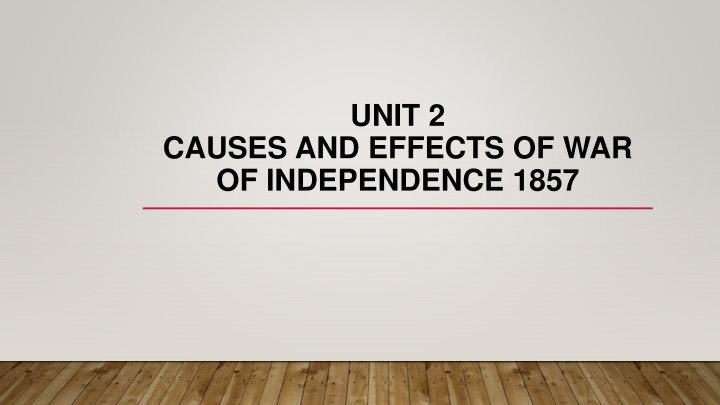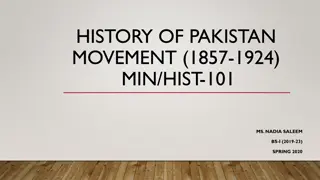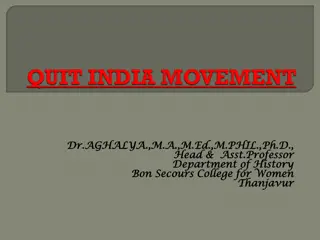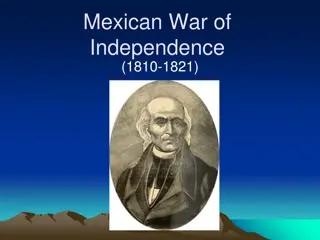Causes and Effects of the 1857 War of Independence in India
Politically, the Doctrine of Lapse and mistreatment of local Indian leaders contributed to the uprising. Religious tensions arose due to British interference and social inequality. Economically, high taxes and exploitation of Indian wealth fueled the discontent. The military also played a significant role. Post-war conditions, particularly for Muslims, saw political and economic struggles. Hindus adapted to the change in rulers more easily.
Download Presentation

Please find below an Image/Link to download the presentation.
The content on the website is provided AS IS for your information and personal use only. It may not be sold, licensed, or shared on other websites without obtaining consent from the author.If you encounter any issues during the download, it is possible that the publisher has removed the file from their server.
You are allowed to download the files provided on this website for personal or commercial use, subject to the condition that they are used lawfully. All files are the property of their respective owners.
The content on the website is provided AS IS for your information and personal use only. It may not be sold, licensed, or shared on other websites without obtaining consent from the author.
E N D
Presentation Transcript
UNIT 2 CAUSES AND EFFECTS OF WAR OF INDEPENDENCE 1857
POLITICAL CAUSES Because of Doctrine of Lapse, the local Indian leaders saw them in decline The Mistreatment with the Mughal Emperor and disrespect that Lord Dalhouise made by moving the royal family from Delhi to Qutb Shah In Civil service jobs were given to less Indians, adding fuel to the fire the British replaced Persian and declared English as the official language
RELIGIOUS CAUSES The use of new type of rifle with a paper cartridges covered with grease Islam, Hinduism, Sikhism were under threat from the British rule as the Christian Missionaries used to come to India and promote their religion Missionaries established schools and taught Christianity
SOCIAL CAUSES Indians were treated as a inferior race British and Indians weren t socially equal The British considered themselves as a superior race and thought that it was their duty to take India away from slavery, cannibalism, superstition and to make it a civilization Spread of British culture.
ECONOMIC CAUSES Practice of imposing high taxes Inability of peasants and landowners to pay tax British made profits from India s wealth Taxes were kept by Britishers.
MILITARY Most of the soldiers in army were Indians and were usually low paid The officer class included British Regular rumors were there that the Muslims and Sikh soldiers are forced to convert to Christianity.
CONDITIONS OF MUSLIMS AFTER THE WAR Political condition Economic condition Educational condition Social conditions
POLITICAL CONDITIONS: Muslims were reduced to nothingness. For Hindus it was mainly a change of masters, readily accepted and reconciled with the change.
ECONOMIC CONDITION: financial bankruptcy and political decline became the fate of the Muslims. They were deprived of employment and opportunities.
EDUCATIONAL CONDITION: The English stopped Arabic and Persian education in schools to neglect Islamic education. The Muslims could not accept English education as they considered it un- Islamic. Christianity was preached in government schools.
SOCIAL CONDITIONS: Muslims were socially rejected from all sides.
CONDITIONS OF MUSLIMS AFTER THE WAR Muslims had ruled over India for about eight hundred years and during this period they protected the religious, traditional and cultural values of Hindus. Acting upon the doctrine of equality, the Muslim rulers never deprived Hindus of their rights. But now the same Hindus refused to give Muslims any status in society. These were the circumstances under which some Muslim leaders reminded the Muslims of their past glory and from that moment started the era of their renaissance.
GOVERNMENT OF INDIA ACT 1858 The War of Independence 1857 was an event of great importance in the history of the Indian sub-continent. After this war the British policy towards Indians changed drastically, especially as far as constitutional development was concerned. For the purpose of addressing the grievances of the Indian population a new Act was introduced in India by the Crown in 1858. The Act was passed by the British Parliament on 2nd August 1858. The main Provisions of the Act of 1858 were as follows:
CONT 1.The rule of British East India Company was abolished and the Government of India was directly taken over by the Crown with Queen Victoria as the supreme monarch. 2.The Crown was empowered to appoint a Governor-General and the Governors of the Presidencies. 3.The Court of Directors and the Board of Control were abolished and their place was taken over by the Secretary of State for Indian Affairs and the India Council.
CONT 4. Extensive powers were given to the Secretary of State for Indian Affairs and the Indian Council consisted of 15 members. The Council was made to assist him but only had an advisory role. 5.The people of India were promised their rights by Queen Victoria under this Act. Complete freedom of religion was ensured and gradual participation in the administration of the country was also proclaimed.
CONT 6. Pardon was given to all the Indians except those who had killed British people. The Act said that the princes of the states could retain their former status and all agreements with the princes will be honoured. 7. Doctrine of Lapse was discarded under this Act.
CONT According to this Act the Secretary of State for Indian Affairs was given extensive powers. He was not answerable to anyone. He could do whatever he wants to do. Neither Parliament nor Indian Council could bind him for taking any action; both of these institutions were not given the power to put limits on his extensive powers. Moreover the promises that were made by Queen Victoria were never fulfilled by her. The Indian people were not given their due rights that were promised to them under this Act.























